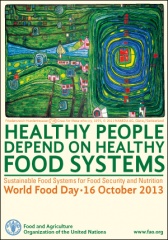Today marks World Food Day, and despite significant gains in the fight against hunger in recent years, an estimated 842 million people—or 1 in 8 people worldwide—still suffer from chronic hunger. According to the 2013 Global Hunger Index (GHI), levels of hunger are still “alarming” or “extremely alarming” in 19 countries.
As the international community grapples with how to sustain an ever-expanding global population, one concept has gained recent favor: resilience. The vulnerability of the world’s poor to both natural and manmade shocks carries very real implications for long-term poverty alleviation and food security.
Resilience, the theme of this year’s GHI report, involves not only the capacity to absorb shocks in the short term, but also the ability to learn from and adapt to moderate shocks and to transform economic, social, and ecological structures in response to severe shocks.
For traditional pastoralists, for example, resilience could consist of an assortment of absorptive, adaptive, and transformative activities. According to Derek Headey, IFPRI research fellow and coauthor of the GHI report, responding to a minor or moderate shock could mean moving the herd to find more water or grazing land or even selling or slaughtering livestock. More severe shocks could require even larger responses. “You can imagine that some communities that are exposed to very severe droughts or conflict may need to change their livelihoods altogether, so [those] would be transformative responses and could involve things like out-migration,” said Headey.
This multidimensional concept of resilience points to a shift in the way development and humanitarian aid communities do business. It prioritizes self-sufficiency by supporting the mechanisms and institutions that strengthen local capacity to withstand weather shocks and points to the need for tighter links between emergency assistance and long-term development assistance. According to the GHI report, “This could help expand the dialogue between the relief and development sectors, which have traditionally operated in separate silos. Linking interrelated short-term shocks and long-term systemic change provides a more complete view of the factors that lead people to drift into poverty or food and nutrition insecurity.”
This holistic approach to food security is closely linked to the theme of this year’s World Food Day: sustainable food systems. This theme promotes the principle that healthy people are a product of healthy systems that are built by proper policies and institutions. According to the Food and Agriculture Organization of the United Nations (FAO), “Every aspect of the food system has an effect on the final availability and accessibility of diverse, nutritious foods—and therefore on consumers’ ability to choose healthy diets.”
As we mark World Food Day, it is important to consider how we can build systems that help the most vulnerable people adjust, adapt, and transform in ways that promote a food-secure future.







